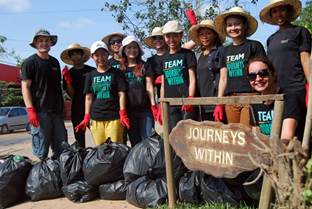During her first trip to Southeast Asia, Booking Coordinator Courtney was struck by the environmental issues that face Cambodia and Vietnam. Here she looks to help others prepare for the little talked about reality of countries in transition…
There is no doubt that Southeast Asia has some of the most lush landscapes on the planet. After visiting Cambodia and Vietnam I became much more aware of how the lack of education and environmental laws in the region effect the flora and fauna. It is a sad sight to see garbage littering otherwise tranquil roads, or places where deforestation claims pristine jungle. Although these issues are hard to accept, I decided to look at this as a learning experience. Here are some of my tips to help you prepare for such issues…
1. Educate yourself
Traveling through Cambodia, I have to admit I was shocked by the amount of trash I saw soiling the environment. While I had researched the country before I left, only the most picturesque landscapes and monuments were represented. I came to realize that there is little in the way of government services (trash collection included) and that environmental education was on the top of few agendas.
For those planning to travel I would say have a look at issues affecting the area that you plan to visit in advance and of course talk to your guides about what you see once you land. Not only will this help give you a better understanding of what local residents deal with but it will also help mediate expectations for when you hit the road.
2. Don’t jump to conclusions
In Vietnam we came across things like Shark Fin Soup casually listed on the menu next to endangered fish species and sea turtles. Yet, when I observed the traditional fisherman paddling miles out to sea in their small round coraclesor bamboo rowboats, it is easy to understand that sometimes one does what they must to survive.
In both Cambodia and Vietnam, everything is considered edible and there are recipes for all of them. (Our guides in Cambodia explained how red ants are used to add a sour flavor to certain soups.) This means that any species is a potential meal for a hungry family.
It is easy to make judgement about the garbage that you see or other environmental offenses, but there is much going on behind the scenes that you aren’t privy too. Lack of education, options, and leadership, along with a host of other complex factors are at play.
3. Set a good example
When you travel to the region, doing your part can go a long way. Treat the communities you visit like your own by not leaving trash behind, even if you see others (and you will) tossing theirs aside. Consider the amount of litter that comes with your purchases — if you don’t need a plastic bag, ask them not to use one. Be mindful when purchasing items from local markets or food from restaurants that are made from threatened and endangered species. By acting respectfully, you could inspire those around youand will not actively contribute to the problem.
4. Support businesses that act responsibly
In Cambodia, operations such as Flight of the Gibbon, a zipline eco-adventure canopy tour company, have reintroduced a breeding pair of gibbons in the hopes of replenishing the native populations. Sadly, all of the local populations have been hunted to extinction. It is the hope that the gibbons will transition smoothly back into their natural habitat. Like many other projects, the long-term outcome has yet to play out, but their investment in the community provides a level of protection for the surrounding environmentand the other species that call the jungle home. Additionally, they give their guides naturalist training so that they can further educate visitors.
A “green movement” has begun around the major temples such as Angkor Wat where trash cans with painted green leaves encourage visitors not to leave their trash lying about. In the spirit of helping our local community, the Cambodia Journeys Within team braved the summer heat and went out for a trash-pickup day.
In every community there are organizations trying to make a difference. If you are interested in learning more about an issue or helping out a cause, we would be happy to use our regional knowledge to point you in the right direction.





